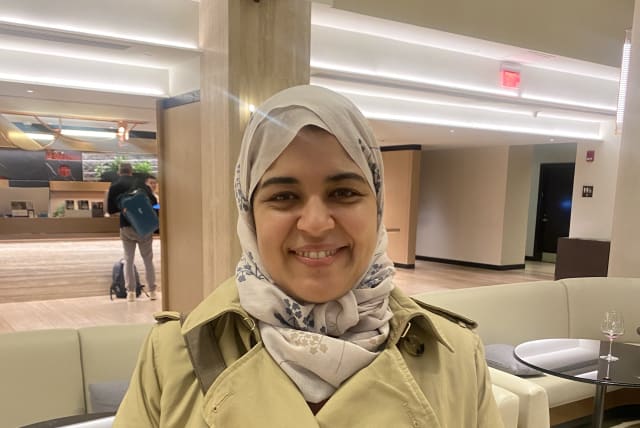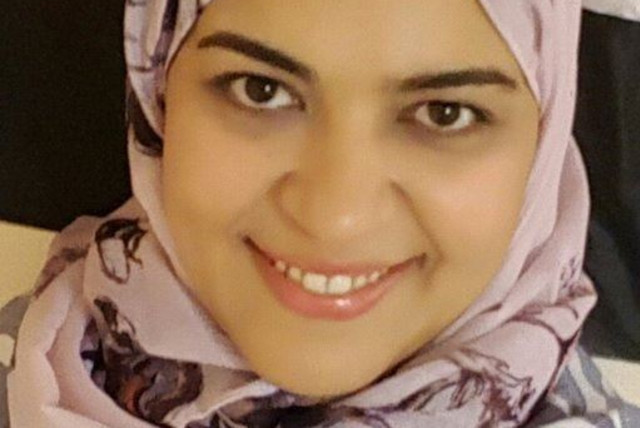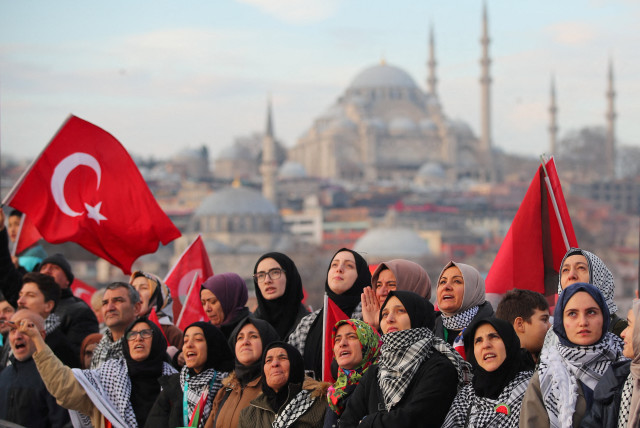Egyptian activist tells ‘Post’ she condemns Hamas and October 7 massacre

Dalia Ziada condemned the Hamas attack on Israel on October 7 but then faced a wave of threats and criticism at home and had to flee to the US.
“I am keeping my voice heard and fighting Islamists, and I also support Israel. I believe Israel is leading this war on behalf of all of us in the Middle East region,” says Dalia Ziada, an Egyptian writer and civil rights activist. She is the executive director of the Center for Middle East and Eastern Mediterranean Studies (MEEM) and the founding chair of the Liberal Democracy Institute.
She took a stand after the Hamas attack on October 7 and condemned it. At the time, this appeared in line with Egypt’s official view as well, which has been against terrorism. However, she faced harsh criticism and threats at home and became a target.
Ziada says her only option was to flee to the US. She says it’s not just about fighting Hamas terrorism but fighting terrorism in the region, “including Hezbollah, Houthis, and all Iran’s proxies. That is, I believe, the most important thing that Arab countries need to understand. I will keep working on that and keep the pressure [going], and I will keep working on Middle Eastern issues. I could have been killed by some extremists or imprisoned back in Egypt. So here I am, trying to keep things moving forward.”
A week before October 7, Ziada was in Washington, speaking at the Atlantic Council about Eastern Mediterranean issues. She takes a deep interest in regional issues, including relations between Egypt and neighboring states and other countries, such as Turkey. It’s hard to remember now, she concedes, but before October 7, the big story in the region was the integration of various countries. This included Israel-Turkey reconciliation and the route linking Israel and the Abraham Accords countries.
For Egypt, it was also a new era of relations. Ziada was in the US speaking about these issues, and she recalls meeting with experts from Israel and Turkey. “The three of us were very optimistic about the eastern Mediterranean, with trends of normalization and reconciliation that had happened over the last several years,” she says.
She flew back to Cairo on October 6. “I woke up to the news of the attack on Israeli civilians. It was not reported in Arabic media like this, but rather as a Hamas attack on Israeli soldiers.” She says that a lot of Arabic media sought to whitewash Hamas’s image. She later took part in a viewing of videos from October 7 that was arranged online by Israel’s Ministry of Foreign Affairs.
They had invited activists and writers to learn the truth about October 7. “They showed us images from the kibbutzim and cars and the mobile phones of the terrorists. It was shocking and horrific,” she says.
Facing a social media struggle
Ziada has a following on social media, and she sought to highlight the truth about October 7 to her audience of Muslims, Egyptians, and Arabic speakers. “I received a horrible backlash. It began with radical Islamists speaking about the Muslim Brotherhood and Salafists. I am used to these attacks because I have been fighting against them all my life. I thought it would go away after some time. It got worse because the Egyptian state began to get on board and attack me with the radical Islamists,” she recalls.
It appears that she became an easy target and a scapegoat at a sensitive time in October, when it was easier for Egyptian authorities to focus criticism on her and a few others rather than pushing people to condemn October 7. Soon after, Ziada says, she discovered that there were legal claims against her. “They are accusing me of threatening Egypt’s national security, spying for the Mossad, and committing high treason. Unfortunately, this could lead to a death sentence or, in the best-case scenario, a life sentence.”
She has since learned that everything she had built up in her life, both in Egypt and with opportunities to study abroad in Turkey, was at risk. A university in Turkey canceled her fellowship. Turkey’s government was also taking a hard line, backing Hamas and slamming Israel. “They decided I should not come to Turkey,” she says. So, she went to the US.
She wasn’t the only person in Egypt to face this deluge of criticism. Several others were also harassed and left for countries abroad, such as Canada. “I had to leave Egypt within three hours, leaving everything behind, including my family, my car, my house, and all my material possessions. In a minute, I was stripped of everything I had, even my office and colleagues.”
Ziada has navigated the complex and changing politics of Egyptian history in the last decades. As a youth activist, she saw the Arab Spring protests and the rise of the Muslim Brotherhood in 2013, and then its replacement with the current government of Abdel Fattah al-Sisi. She was a supporter of the government and condemned the Brotherhood. She believed that it was official Egyptian policy to be against groups like Hamas, which are linked to the Brotherhood.
After all, it was such groups that had spread chaos and terror in Sinai back in 2012, in that dark era. “I thought I was in line with what the Egyptian state has been fighting because they have been fighting the Muslim Brotherhood and Hamas,” she says.
Complex choices after October 7
She believes that Egypt’s reaction to October 7 reflects a complex choice, as do some wider Arabic media reactions. While many of the moderate states condemn terrorism and the Brotherhood, they need to navigate the fact that some people in the region have backed October 7. Some countries also face economic challenges, and it’s easier to distract people by appearing to condemn Israel. Israel had backed Egypt’s war on terror, but after October 7, many countries initially distanced themselves from Egypt.
Jordan, for instance, has often critiqued Israel. Today, there may be a shift in the other direction in the Gulf among the UAE and some states that now understand that Hamas has brought ruin to Gaza. The moderate states want to partner with the US and its potential greater role in backing Gazans, for instance.
Ziada is passionate in her condemnation of the Hamas massacre. She insists that when you see something wrong, “you have to do something. I saw the scenes of children being killed and women being abused – how women and children were tortured that day. I felt a responsibility to stand up for these people. The lies in our Arabic-language media were too much, portraying the Israeli people as evil when the truth is the other way around. My stance on Hamas has not changed. I always saw it as a terrorist organization, unlike some others who see it as a terrorist group when it attacks us but as resistance when it attacks Israel. I see it as a terrorist group that practices horrific attacks on Israelis and Arabs. Israel and Egypt are interdependent neighbors.
“When we improve our relationship with Israel, the quality of life improves. It’s in our interests to have good relations with Israel. I wanted to bring justice to these people. I’m a civil rights activist. I couldn’t keep silent,” she says.
Ziada knew she would get some pushback; she has always been a vocal activist. However, she was surprised by the vitriol she faced and felt a sense of betrayal. But it won’t silence her.
Jerusalem Post Store
`; document.getElementById("linkPremium").innerHTML = cont; var divWithLink = document.getElementById("premium-link"); if (divWithLink !== null && divWithLink !== 'undefined') { divWithLink.style.border = "solid 1px #cb0f3e"; divWithLink.style.textAlign = "center"; divWithLink.style.marginBottom = "15px"; divWithLink.style.marginTop = "15px"; divWithLink.style.width = "100%"; divWithLink.style.backgroundColor = "#122952"; divWithLink.style.color = "#ffffff"; divWithLink.style.lineHeight = "1.5"; } } (function (v, i) { });


